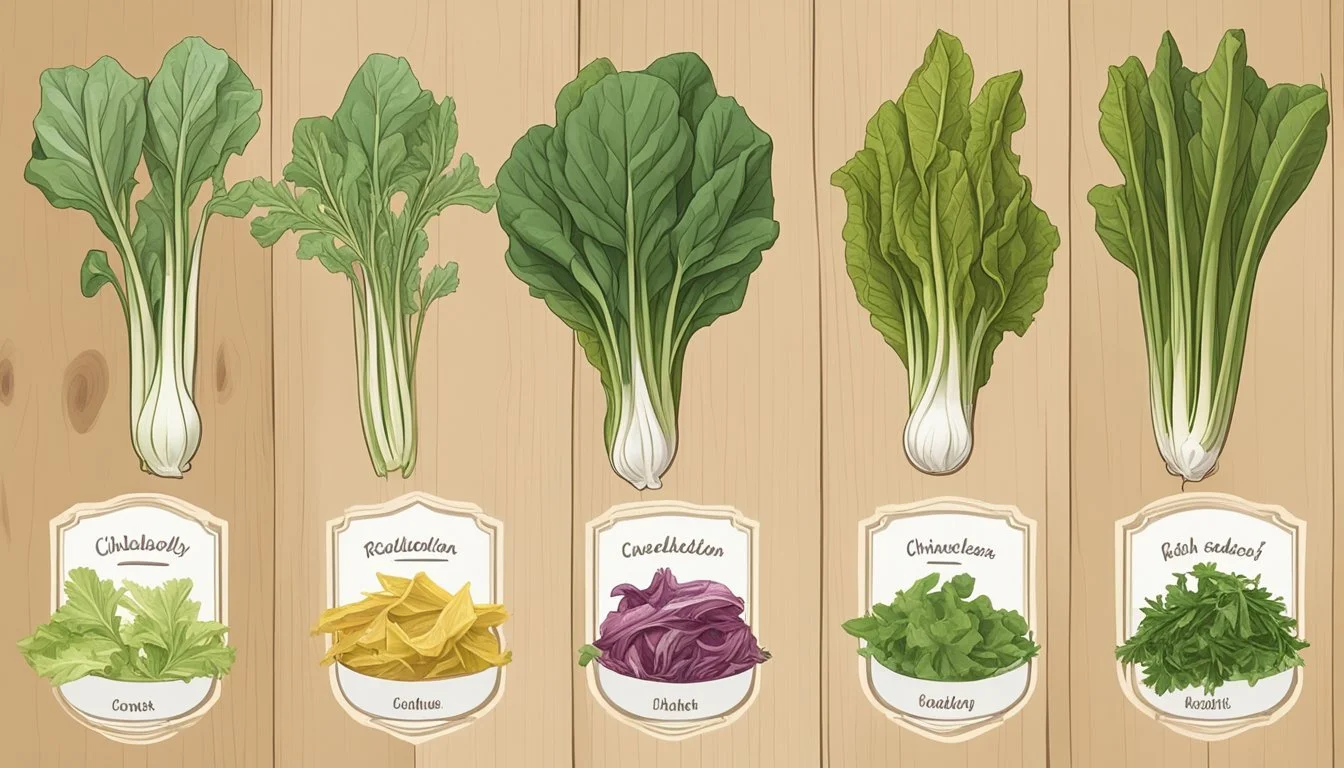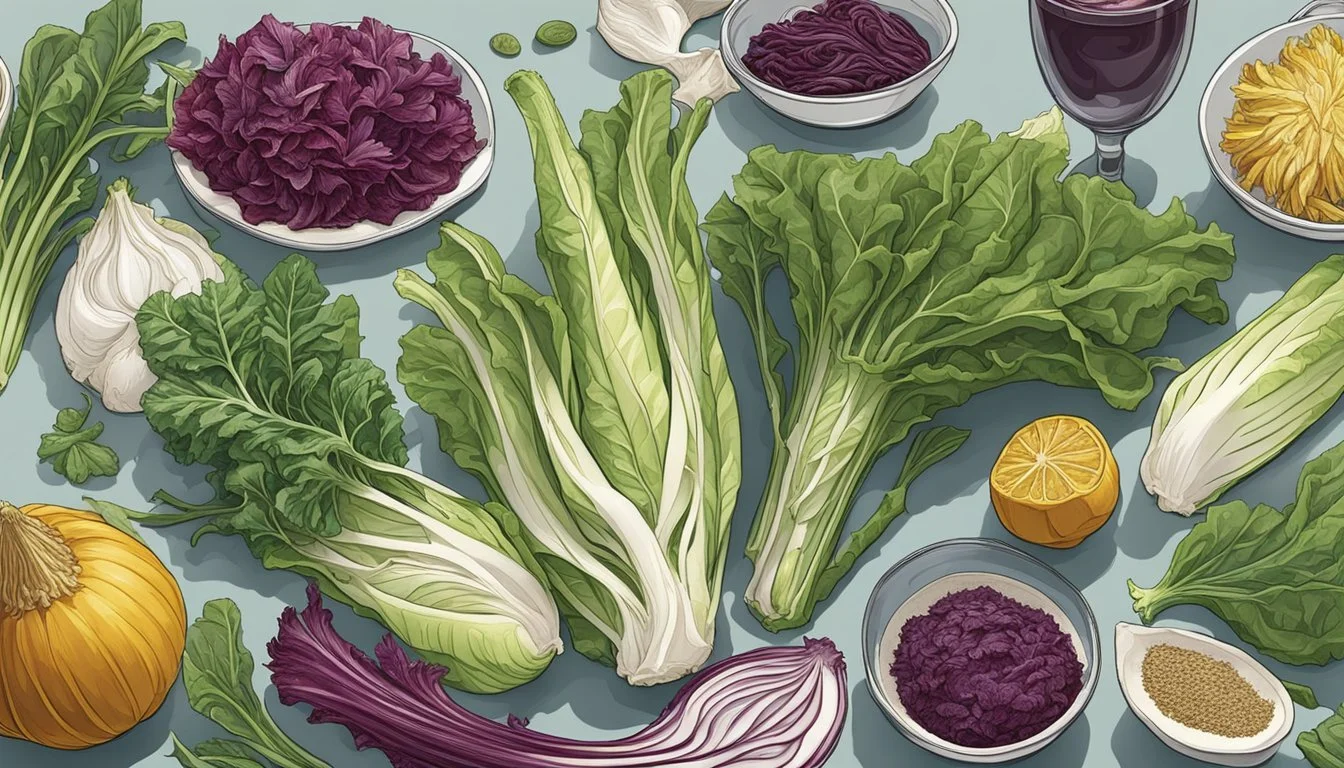Chicory Substitutes
Top Alternatives for Coffee and Recipes
Chicory, a versatile leafy green often used in salads and as a coffee substitute, has unique flavors and benefits that many seek to replicate. For those seeking alternatives, several options can seamlessly replace chicory in various dishes. Frisée, also known as curly endive, provides a slightly bitter taste similar to chicory and can be an excellent substitute in salads.
Watercress and arugula are other viable substitutes. Watercress offers a peppery taste comparable to chicory, making it a suitable option for different recipes. Similarly, arugula’s peppery notes match well with salads and sandwiches. Lastly, kale, with its milder bitterness, can also serve as an adaptable chicory replacement, especially when cooked.
For those looking for a caffeine-free coffee alternative, chicory’s distinct flavor can be mimicked by certain products like Teeccino Maca Chocolaté, which offers prebiotic, caffeine-free, and acid-free benefits. This ensures that the rich and flavorful experience of chicory coffee can still be enjoyed without compromising on health benefits.
Understanding Chicory
Chicory, scientifically known as Cichorium intybus, is a versatile plant prized for its roots, which serve as a coffee substitute, and its beneficial health properties. Notably, chicory root contains inulin, a type of prebiotic dietary fiber, and the plant is recognized by its characteristic purplish-blue flowers.
Chicory Root and Its Uses
The chicory plant, particularly its root, is widely used as a coffee alternative known as chicory coffee. The root is roasted, ground, and brewed much like coffee beans, offering a flavor profile that is rich and slightly woody without any caffeine content. This makes it ideal for those looking to reduce caffeine intake. Chicory root's versatility extends beyond beverages; it is also used in cooking as a flavor enhancer in everything from soups to baked goods.
Health Benefits of Chicory
Chicory root is notable for its inulin content, a form of prebiotic fiber that promotes gut health by stimulating the growth of beneficial bacteria in the intestines. This dietary fiber aids digestion, helps manage blood sugar levels, and can improve bowel regularity. Additionally, inulin has been linked to supporting immune function and enhancing the absorption of minerals like calcium and magnesium, which are vital for bone health.
Chicory in Culinary Traditions
In various culinary traditions, chicory has been used both as a vital ingredient and a flavoring agent. In France, roasted chicory root has been a traditional addition to coffee to create "New Orleans coffee," a blend that imparts a distinctive, rich taste. In Belgian cuisine, the leaves of the chicory plant, often referred to as endive, are utilized in salads, preparing a slightly bitter, crunchy addition. This adaptability illustrates chicory's longstanding presence in diverse gastronomic practices.
Chicory not only offers health benefits and gastronomic uses but also contributes a unique, pleasant flavor to both beverages and culinary traditions around the world.
Common Chicory Substitutes
Chicory substitutes often aim to replicate its unique bitterness and robust flavor, particularly in coffee alternatives. Key substitutes include roasted dandelion root, roasted grains such as barley and rye, various herbal blends, and other root-based options.
Dandelion Root Coffee
Dandelion root coffee is a popular chicory substitute known for its earthy and slightly bitter flavor, similar to coffee. Derived from the dandelion family, this alternative involves roasting the root to develop its coffee-like aroma and texture. Its naturally caffeine-free nature makes it ideal for those seeking a coffee substitute without the jitters. It's typically brewed much like traditional coffee, providing a warm and satisfying beverage that closely mimics the experience of drinking coffee.
Roasted Grain Coffees
Roasted grain coffees incorporate barley, rye, and sometimes roasted soybeans to achieve a rich, coffee-like flavor. The roasting process caramelizes the grains, producing a deep and aromatic brew. Barley and rye are particularly effective because they offer a bitterness and complexity reminiscent of chicory. Carob, another ingredient used in some blends, adds a sweet and chocolatey note, balancing the bitterness. These substitutes are often found in health food stores and can be brewed in traditional coffee makers.
Herbal Coffee Alternatives
Herbal coffee alternatives blend various herbs, nuts, and roots to create a complex, caffeine-free beverage. Common components include carob, figs, and roasted chicory, providing a balance of bitter, sweet, and earthy flavors. Brands like Teeccino offer popular herbal blends that often include prebiotic fibers beneficial for digestion. These mixes are designed to brew just like regular coffee, offering a familiar ritual without caffeine. The versatility of herbs and added flavors caters to varied tastes.
Other Root-Based Substitutes
Other root-based substitutes for chicory include ingredients like burdock root and beetroot. Burdock root, when roasted, imparts a deep, nutty flavor that closely resembles coffee and chicory. Beetroot, on the other hand, brings a slightly sweet and earthy profile. These roots can be mixed with other ingredients to create a balanced and robust coffee alternative. Roasting and brewing methods are similar to those used for chicory and can produce a satisfying, caffeine-free drink that appeals to those seeking new flavors.
Factors to Consider When Choosing Substitutes
When selecting substitutes for chicory, it's essential to focus on taste and flavor, health and dietary preferences, and availability.
Taste and Flavor Profile
The flavor is paramount when choosing a chicory substitute. Chicory itself has a distinct earthy and bitter flavor that can be difficult to replicate. Some substitutes, such as rocket (arugula) and radicchio, offer similar bitter notes.
Other options, like escarole (or endive) and watercress, provide a slightly peppery and nutty flavor. Consider how closely the substitute matches the desired taste of chicory. Exploring flavor compatibility ensures the substitute harmonizes well in recipes where chicory's unique profile is needed.
Health and Dietary Preferences
Health and dietary preferences also play a crucial role. Chicory is renowned for its prebiotic properties, high in fiber, and packing antioxidants, vitamins, and minerals. Substitutes should ideally offer similar health benefits.
For instance, watercress is noted for its abundance of vitamins and antioxidants, which can support weight loss and blood sugar control. Similarly, escarole is rich in fiber and beneficial for digestive issues. Keep dietary needs, such as allergies and nutritional goals, in mind to select the most fitting substitute.
Availability and Accessibility
The availability of substitutes can often determine the best choice. Some options like romaine lettuce, escarole, and watercress are commonly found in most grocery stores.
Other substitutes, such as radicchio or rocket, might be more seasonal or specific to certain regions, affecting their accessibility. Ensure the chosen substitute is easily obtainable and fits within the seasonal availability to make meal planning and preparation more convenient.
By considering these factors, one can effectively choose suitable chicory substitutes that meet culinary and health needs while being readily accessible.
How to Use Chicory Substitutes in Cooking
Chicory substitutes can be seamlessly integrated into various culinary applications, from coffee brewing to enhanced meal recipes and cooking adaptations. Specific substitutes like arugula, frisée, and carrot greens introduce unique flavors to salads and soups, while alternatives like chocolate offer creative twists for beverages.
Coffee Brewing with Chicory Substitutes
For those who enjoy chicory coffee but seek alternatives, several options match its unique flavor profile.
Chocolate emerges as a notable chicory substitute. It complements coffee with its rich, deep flavors. Ground chocolate can be directly added to coffee grounds before brewing. Using a French press or a drip coffee maker with chocolate enhances the beverage's complexity while keeping it caffeinated and less bitter.
Teeccino, a chicory-free herbal coffee, offers varieties that mimic the taste of chicory coffee, such as the Maca Chocolaté flavor. This option is caffeine-free, prebiotic, and acid-free, catering to those who prefer a healthier coffee alternative.
Integrating Substitutes into Meals
Chicory is lauded for its role in salads and soups, but several substitutes can fill the same niche effectively.
Arugula, known for its peppery taste, can replace chicory in salads and sandwiches, adding a robust flavor. Frisée, with its slightly bitter profile, works excellently in salads and complements various dressings and toppings.
For cooked dishes, carrot greens offer a unique taste and can be sautéed or added to soups and stews, enhancing the overall dish with their subtle bitterness. These greens pair well with a range of spices, adding a distinct herbal note to the meal.
Adapting Recipes for Chicory Alternatives
When adapting existing recipes that call for chicory, consider both the flavor and texture of the substitutes.
Escarole or endive can be used in place of chicory for recipes requiring cooked greens. These vegetables hold up well in high heat, making them suitable for stews and soups. You can simmer them alongside other ingredients to preserve their slightly bitter taste and firm texture.
For raw applications, watercress and radicchio serve as excellent chicory replacements. They offer a similar bitterness and crispness ideal for salads and raw preparations. Romaine lettuce can also serve as a milder alternative, though it lacks the distinctive chicory bitterness.
Experimenting with these chicory substitutes can invigorate staple recipes and introduce novel flavors to your culinary repertoire.
Exploring Leafy Chicory Substitutes
In many recipes, chicory adds a distinct bitterness and crunch, making it a popular ingredient in salads and soups. For those seeking chicory alternatives, several leafy greens offer similar flavors and textures.
Endive and Its Varieties
Endive and Its Varieties are often the first choice when looking for chicory substitutes. Escarole and curly endive (frisée) are notable options. Escarole is less bitter than chicory, with broad, pale green leaves. It's excellent in both cooked dishes and raw salads.
Curly endive, also known as frisée, has a distinctive lacy appearance and a mildly bitter flavor. It complements other salad greens and adds texture. Radicchio, a red-leafed endive, offers a similar bitterness with a striking color contrast, making it a visually appealing addition to dishes.
Other Leafy Greens as Substitutes
When chicory is unavailable, arugula, kale, and watercress can serve as effective substitutes. Arugula has a peppery flavor that can mimic chicory's bitterness, working well in salads and sandwiches. Kale, especially younger, tender leaves, provides a hearty texture and slightly bitter taste.
Watercress, with its peppery and fresh notes, is another excellent option, particularly in salads. Winter lettuce, although less bitter, can also be used, offering a mild flavor that pairs well with other bitter greens. These alternatives ensure that the unique qualities chicory brings are not lost in the dish.
Using Leafy Substitutes in Salads
Incorporating leafy greens as chicory substitutes in salads can enhance flavor and texture. Combining curly endive or frisée with milder greens like butter lettuce or romaine creates a balanced salad. Adding arugula or watercress can introduce a slight bitterness and peppery notes, enhancing the salad's complexity.
When using radicchio, its vibrant color can make the salad visually appealing, while its bitterness complements sweet or citrusy dressings. Mixing these substitutes allows for creative and flavorful salads that retain the unique qualities of chicory. Each alternative brings its own set of benefits, from texture to taste, making them versatile options in various culinary applications.
Beverages as Chicory Alternatives
For those looking to replace chicory in their hot beverages, there are several options that provide similar benefits and flavors. These alternatives include herbal teas with health advantages and exotic drinks like yerba mate, which offers a unique taste profile.
Herbal Teas with Similar Benefits
Herbal teas are a popular chicory alternative acclaimed for their health benefits. Notable options include dandelion root tea, often brewed for its detoxifying properties and roasted flavor. Rooibos tea, another excellent substitute, is caffeine-free, rich in antioxidants, and boasts a naturally sweet taste.
Chamomile tea, commonly enjoyed for its calming effects, can also serve as a chicory coffee substitute. Each of these teas provides a unique set of health benefits, such as aiding digestion or reducing inflammation, making them suitable alternatives for those avoiding caffeine or looking for similar nutritional advantages.
Exotic Alternatives Like Yerba Mate
Yerba mate, a South American drink, presents a robust alternative to chicory. It is brewed from the leaves of the Ilex paraguariensis plant and offers a moderate caffeine content, making it an energizing yet less intense substitute for coffee. Its flavor is earthy and can be somewhat bitter, appealing to those who appreciate complex taste profiles.
Kola nut infusion is another exotic option, traditionally used in African cultures. It provides a natural caffeine kick and a slightly bitter flavor. Both yerba mate and kola nut drinks not only mimic the invigorating aspect of chicory but also introduce diverse cultural brewing practices into the mix. These beverages cater to those who seek both the functional and sensory characteristics similar to chicory.
Considerations for Specific Diets and Health Conditions
Chicory root is a versatile ingredient known for its potential health benefits, ranging from digestive support to serving as a caffeine-free coffee alternative. Specific dietary needs and health conditions may affect how individuals can incorporate chicory into their diet.
Caffeine Sensitivity and Chicory
For those with caffeine sensitivity, chicory root offers an excellent alternative to traditional coffee. Chicory root coffee is naturally caffeine-free while mimicking the rich, bold flavor of coffee, making it a suitable choice for those avoiding caffeine for health reasons.
Chicory root contains inulin, a prebiotic fiber that can support gut health. This makes chicory root beneficial not only for avoiding caffeine but also for promoting a healthy digestive system. Individuals can find chicory root coffee in many health food stores.
Chicory for Digestive and Gut Health
Chicory root is renowned for its positive impact on digestive health. The inulin in chicory acts as a prebiotic, feeding beneficial gut bacteria and improving bowel movements. This prebiotic fiber enhances gut health and can aid in relieving digestive issues such as constipation.
Regular consumption of chicory can promote a balanced gut microbiome. However, it's essential to start with small amounts to avoid gastrointestinal discomfort. The fiber content of chicory contributes to overall bowel health and helps support regular digestive functions.
Allergies and Intolerances
People with allergies to ragweed, chrysanthemums, marigolds, or daisies should exercise caution with chicory. It can trigger allergic reactions, such as itching, hives, or even more severe symptoms like shortness of breath and facial swelling. Those known to be allergic to these plants should avoid chicory to prevent adverse reactions.
Chicory may also cause reactions in those with food intolerances, particularly if consumed in large quantities. Proper consultation with a healthcare provider is advisable if there is any concern about potential allergies or intolerances related to chicory consumption.
Where to Find Chicory and Its Substitutes
Chicory is often available in grocery stores, particularly in the produce section. It may also be found in the form of chicory root, which is commonly used in coffee alternatives.
Health food stores typically carry a wider range of chicory products. These stores may offer chicory greens, chicory root, and products made from chicory as alternatives to coffee.
Online retailers provide a convenient option for finding both chicory and its substitutes. Websites like Amazon, Thrive Market, and specialty health food sites often stock various chicory items and substitutes.
For those seeking alternatives to chicory, options abound. Arugula, known for its peppery flavor, is a popular substitute frequently found in supermarkets. Radicchio and escarole (or endive) are other chicory greens available in the produce aisle.
Frisée, similar to chicory with a slightly bitter taste, can be sourced at specialty markets and some grocery stores. Carob and dandelion root, commonly used as coffee substitutes, are often found in both health food stores and online platforms.
Here's a quick list of places and what you might find there:
Grocery Stores: Chicory greens, arugula, radicchio, escarole, frisée
Health Food Stores: Chicory root, dandelion root, carob
Online Retailers: Varied chicory products, substitutes like arugula, radicchio, carob, dandelion root
When sourcing these items, it's helpful to visit multiple types of stores to find the best selection.
Pairings with Chicory and Substitutes
Chicory pairs well with various meats, fish, and sweets, and there are equally viable substitutes for these pairings that do not compromise flavor or texture. Familiarizing yourself with these combinations can elevate your culinary creations.
Meats and Fish
Chicory’s bitter leaves add a contrasting bite to smoked salmon. The fresh, crisp texture of chicory offsets the smoky, rich flavor of the salmon.
Ham can be paired with chicory for a delightful blend of saltiness and bitterness, making both ingredients stand out on the plate.
For those seeking substitutes, arugula and endive offer similar textures and flavors. Arugula’s peppery bite and endive’s mild bitterness can complement meats and fish in nearly identical ways as chicory.
Sweets and Desserts
Chicory’s versatility extends to sweets and desserts. Chicory coffee, made from roasted chicory root, provides a deep, rich backdrop for desserts. It pairs particularly well with chocolate, enhancing the sweet and bitter contrasts.
Chocolate and chicory can be used together in recipes for cakes, brownies, and chocolate mousse.
Paring chicory root powder as a coffee substitute with chocolate-based desserts can create unique flavors. For substitutes, carob powder offers a caffeine-free alternative, sharing some flavor elements with chicory and complementing chocolate well.
Sample Pairing Ideas
For a light meal, try smoked salmon on a bed of chicory with a lemon vinaigrette. This combination utilizes chicory's crisp texture to highlight the salmon’s richness.
Combine ham, chicory, and a honey-mustard dressing for a robust, satisfying salad.
In desserts, create a chicory-infused chocolate mousse. Infuse the chicory root into the cream before mixing it with chocolate to impart a unique, bittersweet depth.
Substitute arugula for chicory with a similar approach in these dishes, especially where the greens are meant to add a peppery or bitter note.









